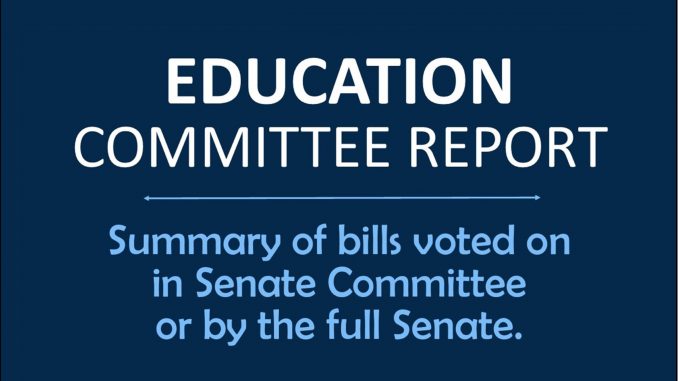
On this page
FLOOR ACTION:
HF 722 – Teach Iowa Scholar Fund
HF 722 allows all available funds in the Teacher Shortage Forgivable Loan Repayment Fund and the Teacher Shortage Loan Forgiveness Repayment Fund to be transferred to the Teach Iowa Scholar Fund. The Teacher Shortage Loan Forgiveness and Forgivable Loan Programs are no longer supported by state funding. The Iowa College Student Aid Commission estimates that approximately $146,000 is available to transfer to the Teach Iowa Scholar Fund, along with a limited number of additional repayments that are received each month. Under the bill, approximately $191,000 will be transferred to the Teach Iowa Scholar Fund in FY22.
[5/5: 48-0 (Excused: Hogg, Nunn)]
HF 744 – First Amendment training at Regents and public schools
HF 744, as amended, requires each public institution of higher education to protect the First Amendment rights of the institution’s students, staff and faculty, and to establish and publicize policies that prohibit intuitional restrictions and penalties based on protected speech to the fullest extent required by the First Amendment to the U.S. Constitution. A public institution of higher education is prohibited from retaliating against a member of the campus community that files a complaint for a violation of this requirement. If a faculty member knowingly and intentionally restricts the protected speech or otherwise penalizes a student, the faculty member is subject to discipline by the institution through the normal disciplinary process, and such discipline may include termination depending on the totality of the facts. If the faculty member is licensed, the Board of Educational Examiners (BOEE) must conduct a hearing, and the faculty member may be subject to disciplinary action by the board.
The bill requires the state Board of Regents to develop materials, programs and procedures on the policies, regulations and duties of the institution regarding free expression on campus. Each Regents institution must provide training on free speech under the First Amendment to all students, faculty, and staff on an annual basis. Elected officials and staff must be permitted to attend. Each school district in the state must protect the intellectual freedom of the school district’s students and practitioners. The districts must establish and publicize policies to protect students and faculty from discrimination based on speech.
The Senate added language related to campus student organizations, free-speech training and protections for newspaper advisors from original SF 478 into HF 744. The House amendment to the Senate Amendment is noted in bold below.
- Student Organizations: Each Regents university will make student government organization authority over moneys disbursed contingent upon compliance with the First Amendment. If a student government organization violates provisions of the bill, after all administrative or judicial appeals, the institution must suspend the organization’s authority to disburse student fees for one year. (House amendment strikes “judicial.”)
- Appeals Board/Complaints: The Board of Regents must annually appoint a three-member nonpartisan free speech appeals committee to receive complaints. School districts must protect the intellectual freedom of the school district’s students and practitioners and must establish policies that protect students and faculty from discrimination based on political bias. A faculty member or K-12 school employee will be disciplined by their institution or the BOEE, if they knowingly and intentionally restrict the protected speech of a student. (House amendment strikes this.)
- Student exercise of free expression: Adds that this bill must be incorporated into existing requirements for public schools to publish rules regarding when students can gather and express free speech, and extends employment protections to teacher/advisors of student newspapers and yearbooks.
- BOEE: The Board may deny a license to or revoke the license if the Board finds by the “preponderance of evidence” that the person discriminates against a student’s free speech. (House amendment inserts the qualification of “knowingly and intentionally” discriminating against student free speech.)
[5/5: 48-0 (Excused: Hogg, Nunn)]
